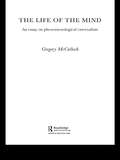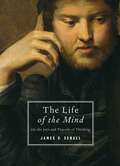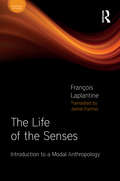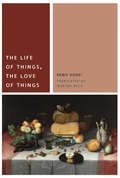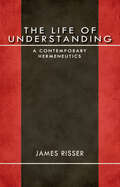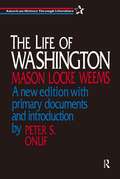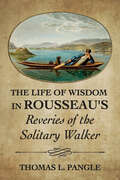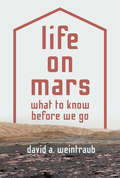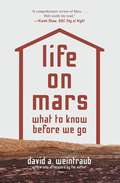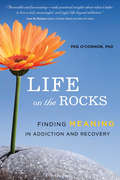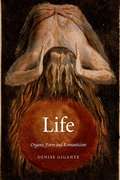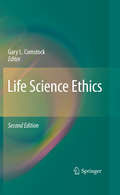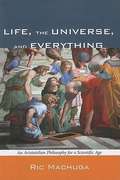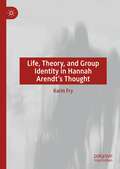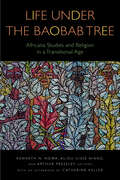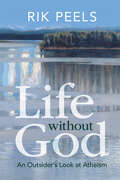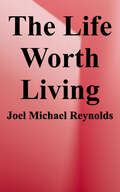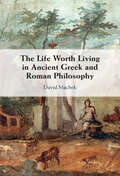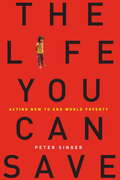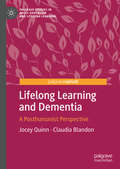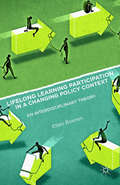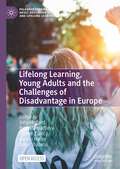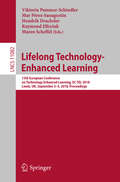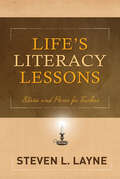- Table View
- List View
The Life of the Mind: An Essay on Phenomenological Externalism
by Gregory McCullochThe Life of the Mind presents an original and striking conception of the mind and its place in nature. In a spirited and rigorous attack on most of the orthodox positions in contemporary philosophy of mind, McCulloch connects three of the orthodoxy's central themes - externalism, phenomenology and the relation between science and common-sense psychology - in a defence of a throughly anti-Cartesian conception of mental life.McCulloch argues that the life of the mind will never be understood until we properly understand the subject's essential embodiment and immersion in the world, until we give up the idea that intentionality and phenomenology must be understood separately. The product of over twenty years' thinking on these issues, McCulloch's book is a bold and significant contribution to philosophy.
The Life of the Mind: On the Joys and Travails of Thinking
by James V. SchallIn The Life of the Mind, Georgetown University&’s James V. Schall takes up the task of reminding us that, as human beings, we naturally take a special delight and pleasure in simply knowing. Because we have not only bodies but also minds, we are built to know what is. In this volume, Schall, author of On the Unseriousness of Human Affairs, among many other volumes of philosophical and political reflection, discusses the various ways of approaching the delight of thinking and the way that this delight begins in seeing and hearing and even in making and walking. We must be attentive to and cultivate the needs of the mind, argues Schall, for it is through our intellect that all that is not ourselves is finally returned to us, allowing us to live in the light of truth.
The Life of the Senses: Introduction to a Modal Anthropology (Sensory Studies)
by François LaplantineBoth a vital theoretical work and a fine illustration of the principles and practice of sensory ethnography, this much anticipated translation is destined to figure as a major catalyst in the expanding field of sensory studies.Drawing on his own fieldwork in Brazil and Japan and a wide range of philosophical, literary and cinematic sources, the author outlines his vision for a ‘modal anthropology’. François Laplantine challenges the primacy accorded to ‘sign’ and ‘structure’ in conventional social science research, and redirects attention to the tonalities and rhythmic intensities of different ways of living. Arguing that meaning, sensation and sociality cannot be considered separately, he calls for a 'politics of the sensible' and a complete reorientation of our habitual ways of understanding reality.The book also features an introduction to the sensory and social thought of François Laplantine by the editor of the Sensory Studies series, David Howes.
The Life of Things, the Love of Things
by Remo Bodei Murtha BacaFrom prehistoric stone tools, to machines, to computers, things have traveled a long road along with human beings. Changing with the times, places, and methods of their production, emerging from diverse histories, and enveloped in multiple layers of meaning, things embody ideas, emotions, and symbols of which we are often unaware. The meaning of “thing” is richer than that of “object,” which is something that is manipulated with indifference or according to impersonal technical procedures. Things also differ from merchandise, objects that can be sold or exchanged or seen as status symbols. Things, in the philosophical sense, are nodes of relationships with the life of others, chains of continuity among generations, bridges that connect individual and collective histories, junctions between human civilizations and nature. Things incite us to listen to reality, to make them part of ourselves, giving fresh life to an otherwise suffocating interiority. Things also reveal the hidden aspect of a “subject” in its most secret and least explored side. Things are the repositories of ideas, emotions, and symbols whose meaning we often do not understand. In an unexpected but coherent journey that includes the visions of classic philosophers from Aristotle to Husserl and from Hegel to Heidegger, along with the analysis of works of art, Bodei addresses issues such as fetishism, the memory of things, the emergence of department stores, consumerism, nostalgia for the past, the self-portraits of Rembrandt and Dutch still-lifes of the seventeenth century. The more we are able to recover objects in their wealth of meanings and integrate them into our mental and emotional horizons, he argues, the broader and deeper our world becomes.
The Life of Understanding: A Contemporary Hermeneutics (Studies In Continental Thought Ser.)
by James RisserIn Gadamer's hermeneutics, interpretation is inseparable from the broader concern of making one's way in life. In this book, James Risser builds on this insight about the juxtaposition of human living and the act of understanding by tracing hermeneutics back to the basic experience of philosophy as defined by Plato. For Risser, Plato provides resources for new directions in hermeneutics and new possibilities for "the life of understanding" and "the understanding of life." Risser places Gadamer in dialogue with Plato, with the issue of memory as a conceptual focus. He develops themes pertaining to hermeneutics such as retrieval as a matter of convalescence, exile as a venture into the foreign, formation with respect to oneself and to life with others, the experience of language in hermeneutics, and the relationship between speaking and writing.
The Life of Washington: With Curious Anecdotes, Equally Honourable To Himself, And Exemplary To His Young Countrymen ... Embellished With Six Engravings
by Mason L. WeemsWeems helped to fabricate the image of Washington that has since dominated the American historical imagination and which in its time, secured Washington's fame. This edition includes documents that provide an insight into the construction of American national identity.
The Life of Wisdom in Rousseau's "Reveries of the Solitary Walker"
by Thomas L. PangleThe Life of Wisdom in Rousseau's "Reveries of the Solitary Walker" is the first complete exegesis and interpretation of Rousseau's final and culminating work, showing its full philosophic and moral teaching. The Reveries has been celebrated as a work of literature that is an acknowledged acme of French prose writing. Thomas L. Pangle argues that this aesthetic appreciation necessitates an in-depth interpretation of the writing's complex and multileveled intended teaching about the normatively best way of life—and how essential this is for a work that was initially bewildering.Rousseau stands out among modern political philosophers in that he restored, to political philosophy, what Socrates and his students (from Plato and Xenophon through Aristotle and the Stoics and Cicero) had made central—and that the previous modern, Enlightenment philosophers had eclipsed: the study of the life and soul of the exemplary, independent sage, as possessor of "human wisdom." Rousseau made this again the supreme theme and source of norms for political philosophy and for humanity's moral as well as civic existence.In his analysis of The Reveries, Pangle uncovers Rousseau's most profound exploration and articulation of his own life, personality, soul, and thought as "the man of nature enlightened by reason." He describes, in Rousseau's final work, the fullest embodiment of the experiential wisdom from which flows and to which points Rousseau's political and moral philosophy, his theology, and his musical and literary art.
Life on Mars: What to Know Before We Go
by David WeintraubThe story of the search for life on Mars—and the moral issues confronting us as we prepare to send humans thereDoes life exist on Mars? The question has captivated humans for centuries, but today it has taken on new urgency. NASA plans to send astronauts to Mars orbit by the 2030s. SpaceX wants to go by 2024, while Mars One wants to land a permanent settlement there in 2032. As we gear up for missions like these, we have a responsibility to think deeply about what kinds of life may already inhabit the planet--and whether we have the right to invite ourselves in. This book tells the complete story of the quest to answer one of the most tantalizing questions in astronomy. But it is more than a history. Life on Mars explains what we need to know before we go.David Weintraub tells why, of all the celestial bodies in our solar system, Mars has beckoned to us the most. He traces how our ideas about life on Mars have been refined by landers and rovers, terrestrial and Mars-orbiting telescopes, spectroscopy, and even a Martian meteorite. He explores how finding DNA-based life on the Red Planet could offer clues about our distant evolutionary past, and grapples with the profound moral and ethical questions confronting us as we prepare to introduce an unpredictable new life form—ourselves—into the Martian biosphere.Life on Mars is also a book about how science is done—and undone—in the age of mass media. It shows how Mars mania has obscured our vision since we first turned our sights on the planet and encourages a healthy skepticism toward the media hype surrounding Mars as humanity prepares to venture forth.
Life on Mars: What to Know Before We Go
by David A. WeintraubThe search for life on Mars—and the moral issues confronting us as we prepare to send humans thereDoes life exist on Mars? The question has captivated humans for centuries, but today it has taken on new urgency. As space agencies gear up to send the first manned missions to the Red Planet, we have a responsibility to think deeply about what kinds of life may already dwell there—and whether we have the right to invite ourselves in. Telling the complete story of our ongoing quest to answer one of the most tantalizing questions in astronomy, David Weintraub grapples with the profound moral and ethical questions confronting us as we prepare to introduce an unpredictable new life form—ourselves—into the Martian biosphere. Now with an afterword that discusses the most recent discoveries, Life on Mars explains what we need to know before we go.
Life on the Rocks
by Peg O'ConnorAddiction and recovery are, at their core, about the meaning of life. Life on the Rocks is the first book to address addiction and recovery from a Western philosophical perspective, offering a powerful set of tools sharpened over millennia. It introduces some of the core concepts and vexing questions of philosophy to help addicts and those affected by their addiction examine and perhaps transform the meaning they make of their lives.Without assuming any familiarity with philosophy, Dr. O'Connor illuminates issues all addicts and their loved ones face: self-identity, moral responsibility, self-knowledge and self-deception, free will and determinism, fatalism, the nature of God, and their relations to others. Life on the Rocks is an indispensable guide to the deeply philosophical concerns at the heart of every addict's struggle.Peg O'Connor, PhD, is professor of philosophy and gender, women, and sexuality studies at Gustavus Adolphus College in Minnesota. She is the author of the popular Psychology Today blog "Philosophy Stirred, Not Shaken" and contributor to the Pro Talk series at Rehabs.com.
Life Organic Form And Romanticism
by Denise GiganteWhat makes something alive? Or, more to the point, what is life? The question is as old as the ages and has not been (and may never be) resolved. Life springs from life, and liveliness motivates matter to act the way it does. Yet vitality in its very unpredictability often appears as a threat. In this intellectually stimulating work, Denise Gigante looks at how major writers of the Romantic period strove to produce living forms of art on an analogy with biological form, often finding themselves face to face with a power known as monstrous. The poets Christopher Smart, William Blake, Percy Bysshe Shelley, and John Keats were all immersed in a culture obsessed with scientific ideas about vital power and its generation, and they broke with poetic convention in imagining new forms of "life. ” In Life: Organic Form and Romanticism, Gigante offers a way to read ostensibly difficult poetry and reflects on the natural-philosophical idea of organic form and the discipline of literary studies.
Life, Organisms, and Human Nature: New Perspectives on Classical German Philosophy (Studies in German Idealism #22)
by Luca Corti Johannes-Georg SchüleinThis collection of essays investigates the notions of life, living organisms, and human nature in Classical German Philosophy from a historical and conceptual perspective. Its 19 chapters move from the peculiarities of organic life to the peculiarities of the distinctly human life form and discuss the strengths and weaknesses of naturalistic accounts of life. In light of the growing interest in nature within current philosophical debates, the book provides an overview of what the philosophical epoch of Kant, Fichte, Schelling, Humboldt, the Romantics, Hegel, and others can contribute to our understanding of life today. The collection of essays represents a plurality of approaches that reflects the pluralism of the tradition itself – highlighting the liveliness and polyphonic nature of the issues at stake and the ways in which they were approached in post-Kantian thought.In combining historical and philosophical investigation, the collection constitutes a unique resource for scholars and graduate students working in various areas related to the study of nature in philosophy, contemporary theories of science, and the humanities more generally.
Life Science Ethics
by Gary L. ComstockDoes nature have intrinsic value? Should we be doing more to save wilderness and ocean ecosystems? What are our duties to future generations of humans? Do animals have rights? This revised edition of "Life Science Ethics" introduces these questions using narrative case studies on genetically modified foods, use of animals in research, nanotechnology, and global climate change, and then explores them in detail using essays written by nationally-recognized experts in the ethics field. Part I introduces ethics, the relationship of religion to ethics, how we assess ethical arguments, and a method ethicists use to reason about ethical theories. Part II demonstrates the relevance of ethical reasoning to the environment, land, farms, food, biotechnology, genetically modified foods, animals in agriculture and research, climate change, and nanotechnology. Part III presents case studies for the topics found in Part II.
Life, the Universe, and Everything: An Aristotelian Philosophy for a Scientific Age
by Ric MachugaHas modern science made philosophy obsolete? Is the soul real? Do we have a free will? Why should we be moral? Does God exist, and if so, why is there so much pain and suffering in the world? What is the relation between faith and reason? - Ric Machuga takes a holistic approach to these questions. No philosophical idea, no matter how small, can live alone. Ideas always gain their force, power, and life from their surroundings--their "ecosystem." The ecosystem of ideas defended in this book comes from the ancient Greek philosopher Aristotle and his medieval interpreter, Thomas Aquinas. The ongoing relevance of their philosophical thought to twenty-first century issues is opened up in fascinating ways. Life, the Universe, and Everything is the product of thirty years of teaching introductory courses in philosophy. Assuming no prior background, it only requires of readers an enquiring mind and a willingness to think carefully. An ideal guide to the big questions we face.
Life, Theory, and Group Identity in Hannah Arendt's Thought
by Karin FryPhilosophy typically ignores biographical, historical, and cultural aspects of theoriss’ lives in an attempt to take a supposedly abstract and objective view of their work. This book makes some new conclusions about Arendt’s theory by emphasizing how her experience of the world as displayed in her archival materials impacted her thought. Some aspects of Arendt’s life have been examined in detail before, including the fact she was stateless as well as her affair with Heidegger. Instead, this work explores different topics including the biographical and narrative moments of Arendt's own work, the role of archiving in her thought, pivotal events that have not been archived, her understanding of her own identities, and how it affected the role of identity politics in her work. Typically, group action is underemphasized in Arendt scholarship in comparison to individual action and often identity politics questions are considered to lie within the realm of the private. Although Arendt’s theory is problematic when discussing issues concerning identity politics, she did think identity politics could be public and political and that effective political actions may occur within groups. What makes this project unique are the innovative conclusions made by moving the archival and biographical evidence to the center in order to understand her theory more accurately and within its historical and cultural context. This volume will be of interest to professional scholars in Arendt’s work, but also to those who have a more general interest in her life and theory.
Life Under the Baobab Tree: Africana Studies and Religion in a Transitional Age (Transdisciplinary Theological Colloquia)
by Shola Adegbite An Yountae Desmond D. Coleman Salim Faraji Rachel E. Harding Minenhle Nomalungelo Khumalo Althea Spencer Miller Pamela Mordecai Rev Canon Hugh R. Page Jr. A. Paige Rawson Nimi Wariboko Sharon Kimberly Williams Catherine KellerLife Under the Baobab Tree: Africana Studies and Religion in a Transitional Age is a compendium of innovating essays meticulously written by early and later diaspora people of African descent. Their speech arises from the depth of their experiences under the Baobab tree and offers to the world voices of resilience, newness/resurrection, hope, and life. Resolutely journeying on the trails of their ancestors, they speak about setbacks and forward-looking movements of liberation, social transformation, and community formation. The volume is a carefully woven conversation of intellectual substance and structure across time, space, and spirituality that is quintessentially “Africana” in its centering of methodological, theoretical, epistemological, and hermeneutical complexity that assumes nonlinear and dialogical approaches to developing liberating epistemologies in the face of imperialism, colonialism, racism, and religious intolerance.A critical part of this conversation is a reconceptualization and reconfiguration of the concept of religion in its colonial and imperial forms. Life Under the Baobab Tree examines how Africana peoples understand their corporate experiences of the divine not as “religion” apart from its intimate connections to social realities of communal health, economics, culture, politics, environment, violence, war, and dynamic community belonging. To that end Afro-Pessimistic formulations of life placed in dialogic relation Afro-Optimism. Both realities constitute life under the Baobab tree and represent the sturdiness and variation that anchors the deep ruptures that have affected Africana life and the creative responses. The metaphor and substance of the tree resists reductionist, essentialist, and assured conclusions about the nature of diasporic lived experiences, both within the continent of Africa and in the African Diaspora.
Life without God: An Outsider's Look at Atheism
by Rik PeelsIn this book, Rik Peels explores atheism from a new perspective that aims to go beyond the highly polarized debate about arguments for and against God's existence. Since our beliefs about the most important things in life are not usually based on arguments, we should look beyond atheistic arguments and explore what truly motivates the atheist. Are there certain ideals or experiences that explain the turn to atheism? Could atheism be the default position for us, not requiring any arguments whatsoever? And what about the often-discussed arguments against belief in God—is there something that religious and nonreligious people alike can learn from them? This book explores how a novel understanding of atheism is possible – and how it effectively moves the God debate further. Believers and non-believers can learn much from Peel's assessment of arguments for and against atheism.
The Life Worth Living: Disability, Pain, and Morality
by Joel Michael ReynoldsMore than 2,000 years ago, Aristotle said: “let there be a law that no deformed child shall live.” This idea is alive and well today. During the past century, Supreme Court Justice Oliver Wendell Holmes Jr. argued that the United States can forcibly sterilize intellectually disabled women and philosopher Peter Singer argued for the right of parents to euthanize certain cognitively disabled infants. <p><p>The Life Worth Living explores how and why such arguments persist by investigating the exclusion of and discrimination against disabled people across the history of Western moral philosophy. The author argues that this history demonstrates a fundamental mischaracterization of the meaning of disability, thanks to the conflation of lived experiences of disability with those of pain and suffering. <p><p>Building on decades of activism and scholarship in the field, Reynolds shows how longstanding views of disability are misguided and unjust, and he lays out a vision of what an anti-ableist moral future requires. The Life Worth Living is the first sustained examination of disability through the lens of the history of moral philosophy and phenomenology, and it demonstrates how lived experiences of disability demand a far richer account of human flourishing, embodiment, community, and politics in philosophical inquiry and beyond.
The Life Worth Living in Ancient Greek and Roman Philosophy
by David MachekThe account of the best life for humans – i.e. a happy or flourishing life – and what it might consist of was the central theme of ancient ethics. But what does it take to have a life that, if not happy, is at least worth living, compared with being dead or never having come into life? This question was also much discussed in antiquity, and David Machek's book reconstructs, for the first time, philosophical engagements with the question from Socrates to Plotinus. Machek's comprehensive book explores ancient views on a life worth living against a background of the pessimistic outlook on the human condition which was adopted by the Greek poets, and also shows the continuities and contrasts between the ancient perspective and modern philosophical debates about biomedical ethics and the ethics of procreation. His rich study of this relatively neglected theme offers a fresh and compelling narrative of ancient ethics.
The Life You Can Save: Acting Now to End World Poverty
by Peter SingerThis is the right time to ask yourself: "What should I be doing to help?" For the first time in history, it is now within our reach to eradicate world poverty and the suffering it brings. Yet around the world, a billion people struggle to live each day on less than many of us pay for bottled water. And though the number of deaths attributable to poverty worldwide has fallen dramatically in the past half-century, nearly ten million children still die unnecessarily each year. The people of the developed world face a profound choice: If we are not to turn our backs on a fifth of the world's population, we must become part of the solution. In The Life You Can Save, philosopher Peter Singer, named one of "The 100 Most Influential People in the World" by Time magazine, uses ethical arguments, provocative thought experiments, illuminating examples, and case studies of charitable giving to show that our current response to world poverty is not only insufficient but ethically indefensible. Singer contends that we need to change our views of what is involved in living an ethical life. To help us play our part in bringing about that change, he offers a seven-point plan that mixes personal philanthropy (figuring how much to give and how best to give it), local activism (spreading the word in your community), and political awareness (contacting your representatives to ensure that your nation's foreign aid is really directed to the world's poorest people). In The Life You Can Save, Singer makes the irrefutable argument that giving will make a huge difference in the lives of others, without diminishing the quality of our own. This book is an urgent call to action and a hopeful primer on the power of compassion, when mixed with rigorous investigation and careful reasoning, to lift others out of despair.
Lifelong Learning and Dementia: A Posthumanist Perspective (Palgrave Studies in Adult Education and Lifelong Learning)
by Jocey Quinn Claudia BlandonThis book explores the potential for lifelong learning in dementia. A growing social issue, dementia has previously been understood as a wasteland for learning: at best, those with dementia are helped to hold on to some pre-existing skills. This book draws on extensive qualitative data with people with dementia and their families to demonstrate that new forms of learning can happen in dementia, with positive outcomes for both the learner and those around them. In doing so, this book demonstrates that those with dementia help us to understand learning differently, thus providing a breakthrough in our understanding and theorising of lifelong learning. Using posthuman theory to scaffold and discuss the findings, this pioneering book will appeal to scholars of dementia, lifelong learning and the posthuman.
Lifelong Learning Participation in a Changing Policy Context: An Interdisciplinary Theory
by Ellen BoerenDrawing on the role of individuals, education and training providers and countries' social policy actions, and borrowing insights from psychology, sociology and economics, this book works towards an interdisciplinary theory of adult lifelong learning participation. It explores the fragmented evidence of why adults do or do not participate in adult lifelong learning activities and focuses on the relevance of policy, the social character and expected benefits of lifelong learning participation and discusses the potential implications for policy, practice and research.
Lifelong Learning, Young Adults and the Challenges of Disadvantage in Europe (Palgrave Studies in Adult Education and Lifelong Learning)
by John Holford Pepka Boyadjieva Sharon Clancy Günter Hefler Ivana StudenáThis open access book challenges international policy ‘groupthink’ about lifelong learning. Adult learning – too long a servant of business competitiveness – should be reimagined as central to democratic society. Young adults, especially from disadvantaged backgrounds, engage more in education and training, and learn more day-to-day at work, if provision is democratically organised and based on enduring and inclusive institutional networks, and when jobs encourage and reward the acquisition of skills. Using innovative qualitative and quantitative methods, the contributors develop a critical perspective on dominant policies, investigating – across the European Union and Australia – how ‘vulnerable’ young adults experience programmes designed to improve their ‘employability’, and how ‘skills for jobs’ policies squeeze out wider – and wiser – ideas of what education and training should do. Chapters show why some provision works for those with poor educational backgrounds, why labour market and educational institutions matter so much, how adult education can empower and expand people’s agency, and the challenges of using artificial intelligence in lifelong learning policy-making. Several investigate the pivotal role of workplace learning in organisational life, and in learning during ‘emerging adulthood’. Important comparative studies of workplace learning in the metals, retail and adult education sectors show the role of management, trade unions and social movements in young adults’ learning.
Lifelong Technology-Enhanced Learning: 13th European Conference on Technology Enhanced Learning, EC-TEL 2018, Leeds, UK, September 3-5, 2018, Proceedings (Lecture Notes in Computer Science #11082)
by Viktoria Pammer-Schindler Mar Pérez-Sanagustín Hendrik Drachsler Raymond Elferink Maren ScheffelThis book constitutes the proceedings of the 13th European Conference on Technology Enhanced Learning, EC-TEL 2018, held in Leeds, UK, in September 2018.The 42 full and short papers, 7 demo papers, and 23 poster papers presented in this volume were carefully reviewed and selected from 142 submissions. This year, the European Conference on Technology-Enhanced Learning (EC-TEL) will engage researchers, practitioners, educational developers, entrepreneurs and policy makers in a joint discussion on how to put science, technology and practice at the service of learning to embrace these challenges on the topic: Lifelong technology enhanced learning: Dealing with the complexity of 21st century challenges. Chapter "" is available open access under a Creative Commons Attribution 4.0 International License via link.springer.com.
Life's Literacy Lessons: Stories and Poems for Teachers
by Steven LayneThis poignant collection of stories and poems honors literacy educators for the often difficult and always essential work they do with students of all ages. A well-loved classic, Life's Literacy Lessons , is back in print by popular demand and now includes stories as well as new poems. From reading aloud to grammar, from handwriting to standards, Steven Layne highlights the tears and laughter, the challenges and rewards that inspire today's teachers. And Steven reveals his motivation-;the events, words, and thoughts that led him to capture his musings in verse and prose. Whether you read them to inspire or entertain, these delightful poems and stories are sure to capture your imagination.
